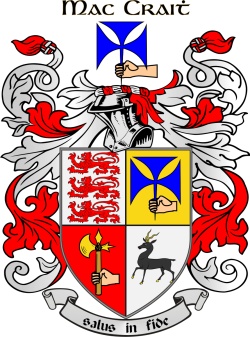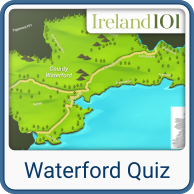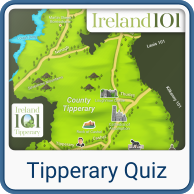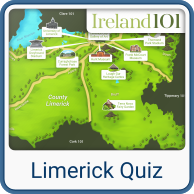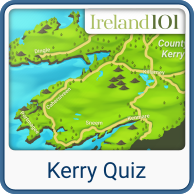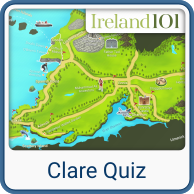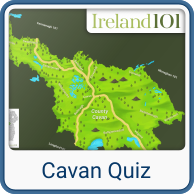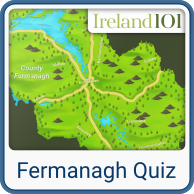101,099 McGrath Members around the world.
See one of our recent Ireland101 Tribe Gatherings
Mc Grath Family History
Mac Craith- anglicised as McGrath, Magragh, Macgragh, MacGrath, MacGragh, MacGraw, &c. An equally legitimate form in Irish is Mac Raith or Mag Raith. The root word is possibly 'Raith', which Woulfe says means 'grace' or 'prosperity' ('Sloinnte Gaedheal is Gall', Dublin, 1923). 'Mac' or abbreviated form 'Mc', simply means 'son'.
There were families of the name in early times in Donegal, Thomond, Waterford and the north of Ireland, where they came as settlers from Scotland. To take the Donegal MacGraths first, these were coarbs (incumbents of an abbey &c., who were successors of the founding saint) of St Daveog, now known as Termon Macgrath at Lough Dearg; their castle, though, was at the head of Lough Erne. The Thomond ( Tuadh Mhumhain: modern Clare & Limerick) family were hereditary filidh (poets and genealogists) to the O Briens. The fili (Old Irish: plural filid) was really more genealogist than poet, being bound by strict rules in 'job description': viz. to tell of the past deeds of the clan, and safeguard its continuous pedigree or family record. The Scottish family were orignally of Kintail. The name is fairly numerous in 19th century Ulster records, principally in Tyrone and Down.
It seems that MacGraths, both north and south were a scholarly tribe. The Thomond family were, in the 16th century, the ollúna, or master teachers, at the bardic school in Cahir, Co Tipperary. The Thomond McGraths have been numerous in that county and Co Waterford since that time. There were plenty of small farmers in South Tipperary in the 19th century, and into modern times.
In Sir William Petty's 'Census' of 1659, really an ambitious survey of Ireland and its population, both native and settler, in the Cromwellian period, we find the name as a 'Principal Irish Name' in:
Co Donegal
Tirhugh Barony, 14 (all figures for households or families) McGragh.
Co Fermanagh
under Parishes of Aghararcher &c., 8 McGragh & McGra.
Co Limerick
Costlea Barony, 17 MacCraith.
Co Tipperary
Iffa & Offa Barony, 35 McCrath; Upper Ormond, 11 Magrath; Owney & Arra, 8 of Mc & Magrath; Clanwilliam, 17 Magrath & McCrath.
Co Waterford
Decies Barony, 57 Cragh & McCragh; Glenahiry, 5 McCragh; Upperthird, 9 McCragh.
By the time of Griffith's 'Primary Valuation' of Irish households in the 1850s, the top counties for McGrath were: Tipperary 450 (all figures =households), Waterford 274, Limerick 166, Cork 149, Clare & Kilkenny 145 each, and Down 134. The spelling McGrath was the most numerous with 2485 entries, followed by Magrath with 841 entries.
The top counties for variant Magrath were: Tipperary 141, Down 60, Kilkenny 58, Tyrone 54 and Waterford 43.
R.E. Matheson's 'Special Report on Surnames in Ireland' (1894, 1909), based on the 1890 births distribution, shows most McGraths in counties Tipperary, Cork, Waterford, Antrim and Tyrone. There were 233 entries for McGrath and 31 for Magrath. 131 of all entries were in Munster.
Remarkable McGraths:
Ruadhrí Mac Craith of Termonmagrath (fl. 15th/16th c.) was the patron of the 'Annals of Ulster', a major source for Irish history and genealogy. This is the Donegal/Fermanagh family.
Miler McGrath (1523-1622) of the Fermanagh McGraths, famous for 'doing the impossible': held both Catholic and Protestant bishoprics at the same time! He'd actually started as a Franciscan friar, then became a Protestant, rising to become Bishop of Cashel, whilst at the same time 'occupying' the Catholic chair of Down. He must have enjoyed being a bishop, because he did it four times! He only married twice, however.
Master M'Grath (1866-1873) of the Waterford clan. This greyhound has been celebrated in song and story. He was Lord Lurgan's prize coursing greyhound. Legend says that he was rescued as a pup from drowning, by an inebriated gentleman. He went on to beat all the competition, in both Ireland and England, winning the Waterloo Cup three times. He was summoned to appear before Queen Victoria. He should have been knighted.
